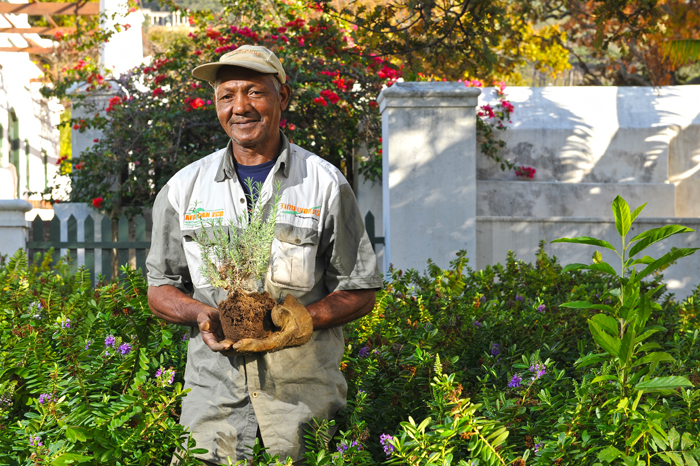Conversations in community
21 May 2015
The Constant Gardener: Jonathan Fritz
Jonathan Fritz walks slowly, with the benevolent stoop of a grandfather, secateurs and soiled suede gloves behind his back, between the lavender and flowering rosemary and the heritage roses on the Welgelegen estate.
For over 30 years he's inclined himself towards the soil, bending to tend the new and vulnerable, the tender shoots and buds; a careful surgeon excising the dead and brittle – the twigs and takkies.
"Die tuin was vir my natural gewees," he says of his long years ministering to the landscapes that are part of Estates & Custodial Services. These include the sports grounds and the many thousands of trees on UCT's estate.
Fritz's domain extends from Welgelegen's historic gardens to the Irma Stern Museum, just down the road on middle campus.
Today, on the foot of the wind, autumn leaves tumble and rush across the gravel like eager puppies. Others float down from the crowns and boughs of pin oaks.
Fritz smiles and shakes his head. He's raked up, oh, hundreds of bags in his time. The leaves feed the compost maker on upper campus.
The change of seasons is also showing below the terraced gardens recently restored by heritage landscaper Gwen Fagan, an expert on heritage roses. Several bushes are in bloom, still heavy with their mottled pink, almost limp petals, and Fritz's secateurs clip-clip-clip at the straggly bits as he walks.
"Eintlik, pruning is wat ek goed doen."
These heritage bushes don't like severe pruning, he explains. Their appeal is in their size and natural shape.
Gardens have always been part of his family's history.
Fritz grew up in the small Retreat community that lived behind the old Sea Breeze Drive-in, erected in the 1960s. Though the monument to the original Spotty Dog roadhouse remains, the other yesteryear landmark in the neighbourhood, there is little to remind one of the drive-in – except memories of veterans like Fritz.
Here he watched feature films on the drive-in screen, elevated above "bos en lande" that stretched all the way to the site of the Blue Route Mall.
And here, among the 'sinkdakkies', Fritz's father, Esau Fritz, kept a flower and a vegetable garden.
"My pa het my grootgemaak in 'n tuin. Ek het hom gehelp tuin maak en groente plant op ons se yard: uiwe, ertjies, pampoene, tamaties, aardappels..."
His aunt kept horses. It was paradise for a young boy.
"Ons was lekker vry gewees – vry om te speel en te gaan waar jy wil."
Then came the Group Areas Act of 1950 and Fritz and his family (he's the youngest of 11 children) were moved to Council houses in Steenberg. It wasn't far, but it changed their lives.
This is where he attended school. At the age of 17, without any idea of what he wanted to do or sense that there were career options, he started as a packer at Pick n Pay Rondebosch.
Then came a move to the naval dockyard in Simonstown, to the cavernous workshops where fitters and turners worked, manufacturing ship parts and reconditioning the giant propellers of warships and frigates.
"Dit was lekker werk – somtyds swaar."
He came to UCT in 1984 as a casual in the maintenance department until he got a permanent post in the garden maintenance team. Since then there have been other changes; the controversial outsourcing of this section of UCT's workers to one and then another company. It's a fraught part of the university's recent history that still resounds.
The landscape in this precinct of the campus has also changed; Fritz used to tend gardens around the old Protem complex, now occupied by women's residence Graça Machel Hall.
Now, as he walks through terraced gardens at Welgelegen, comes the sound of a male voice singing from a Kopano window and the thud of footballs on the artificial soccer pitch below. A car drives by slowly, lost in the cul de sac.
It's a lesser-known and frequented part of the campus.
But it's a special place for Fritz.
When he started at Welgelegen years ago there was a vegetable garden on the south side, below the M3.
He explains how the house's sunken garden, previously "toegewees van die riete", pampas grass and bulrushes, has been restored by heritage architects.
Each segment in the wagon wheel-shaped garden has been planted with bi-seasonal blue and white flowering plants to reflect UCT's colours: arum lilies, miniature agapanthus and climbing dog roses rambling on the quarter moons of the central island structure.
It's an oasis that welcomes walkers and wildlife. The arum bulbs attract nocturnal visitors: porcupines come down from Devil's Peak through a tunnel that channels the river under the highway, disturbing the earth and leaving quills in exchange.
The gardens attract squirrels by the score, guinea fowl and Egyptian geese. Fritz says that in spring the goslings fall between the roof tiles at Welgelegen and have to be rescued through thin wall and ceiling partitioning.
It's one of the many aspects of life Fritz relishes in a landscape he's tended for so long.
"Daar's vreeslik baie blare," he comments as we climb up the terraces towards the sentries of pin oaks below the paddock. On a lower level his dun-coloured metal spade has cleft the soil, marking the spot where he left off digging earlier.
The leaves, Fritz continues, are best tackled in the early mornings – he's up at four and on a taxi by five to get to campus from Mitchell's Plain where he now lives.
Retirement is five years away and although he enjoys a game of soccer on TV (Manchester United is his team and he was a midfielder as a youngster), he can't imagine life without the gardens.
And in autumn, the work is never done.
Story by Helen Swingler. Photo by Michael Hammond.
If you would like to share your story, or nominate someone you know with an interesting job, hobby or life chronicle, please email Helen Swingler or call ext 3735.
Read related stories:
 This work is licensed under a Creative Commons Attribution-NoDerivatives 4.0 International License.
This work is licensed under a Creative Commons Attribution-NoDerivatives 4.0 International License.
Please view the republishing articles page for more information.
Feature
Front page
Opinions
Previous Editions










